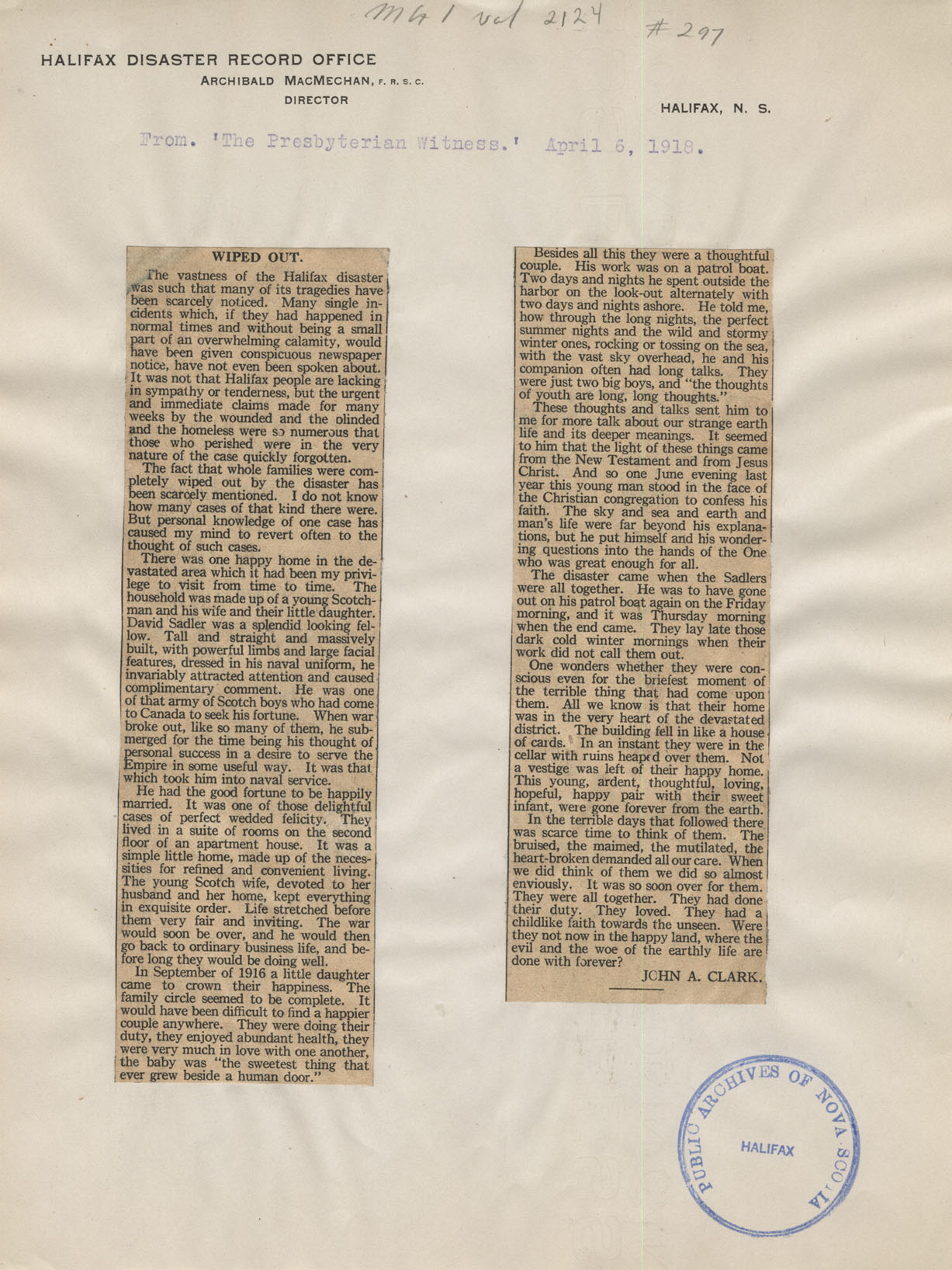Nova Scotia Archives
Archibald MacMechan
Halifax Disaster Record Office Materials
The Presbyterian Witness, "Wiped Out".
06 April 1918. — 1 page : 30 x 40 cm.
note: transcription publicly contributed - please contact us with comments, errors or omisions
Halifax Disaster Record Office
Archibald MacMechan, F.R.S.C
Director
Halifax, N.S.
From. 'The Presbyterian Witness.' April 6, 1918.
Wiped Out
The vastness of the Halifax disaster was such that many of its tragedies have been scarcely noticed. Many single incidents which, if they had happened in normal times and without being a small part of an overwhelming calamity, would have been given conspicuous newspaper notice, have not even been spoken about. It was not that Halifax people are lacking in sympathy or tenderness, but the urgent and immediate claims made for many weeks by the wounded and the blinded and the homeless were so numerous that those who perished were in the very nature of the case quickly forgotten.
The fact that whole families were completely wiped out by teh disaster has been scarcely mentioned. I do not know how many cases of that kind there were. But personal knowledge of one case has caused my mind to revert often to the thought of such cases.
There was one happy home in the devastated area which it had been my privilege to visit from time to time. The household was made up of a young Scotchman and his wife and their little daughter. David Sadler was a splendid looking fellow. Tall and straight and massively built, with powerful limbs and large facial features, dressed in his naval uniform, he invariably attracted attention and caused complimentary comment. He was one of that army of Scotch boys who had come to Canada to seek his fortune. When war broke out, like so many of them, he submerged for the time being his thought of personal success in a desire to serve the Empire in some useful way. It was that which took him into naval service.
He had the good fortune to be happily married. It was one of those delightful cases of perfect wedded felicity. They lived in a suite of rooms on the second floor of an apartment house. It was a simple little home, made up of the necessities for refined and convenient living. The young Scotch wife, devoted to her husband and her home, kept everything in exquisite order. Life stretched before them very fair and inviting. The war would soon be over, and he would then go back to ordinary business life, and before long they would be doing well.
In September of 1916 a little daughter came to crown their happiness. The family circle seemed to be complete. It would have been difficult to find a happier couple anywhere. They were doing their duty, they enjoyed abundant health, they were very much in love with one another, the baby was "the sweetest thing that ever grew beside a human door."
Besides all this they were a thoughtful couple. His work was on a patrol boat. Two days and nights he spent outside the harbor on the look-out alternately with two days and nights ashore. He told me, how through the long nights, the perfect summer nights and the wild and stormy winter ones, rocking or tossing on the sea, with the vast sky overhead, he and his companion often had long talks. They were just two big boys and "the thoughts of youth are long, long thoughts."
These thoughts and talks sent him to me for more talk about our strange earth life and its deeper meanings. It seemed to him that the light of these things came from the New Testament and from Jesus Christ. And so one June evening last year this young man stood in the fact of the Christian congregation to confess his faith. The sky and sea and earth and man's life were far beyond his explanations, but he put himself and his wondering questions into the hands of the One who was great enough for all.
The disaster came when the Sadlers were all together. He was to have gone out on his patrol boat again on the Friday morning, and it was Thursday morning when the end came. They lay late those dark cold winter mornings when their work did not call them out.
One wonders whether they were conscious even for the briefest moment of the terrible thing that had come upon them. All we know is that their home was in the very heart of the devastated district. The building fell in like a house of cards. In an instant they were in the cellar with ruins heaped over them. Not a vestige was left of their happy home. This young, ardent, thoughtful, loving, hopeful, happy pair with their sweet infant, were gone forever from the earth.
In the terrible days that followed there was scarce time to think of them. The bruised, the maimed, the multilated, the heart-broken demanded all our care. When we did think of them we did so almost enviously. It was so soon over for them. They were all together. They had done their duty. They loved. They had a childlike faith towards the unseen. Were they not now in the happy land, where the evil and the woe of the earthly life are done with forever?
John A. Clark.
Reference: Archibald MacMechan Nova Scotia Archives MG 1 volume 2124 number 297

